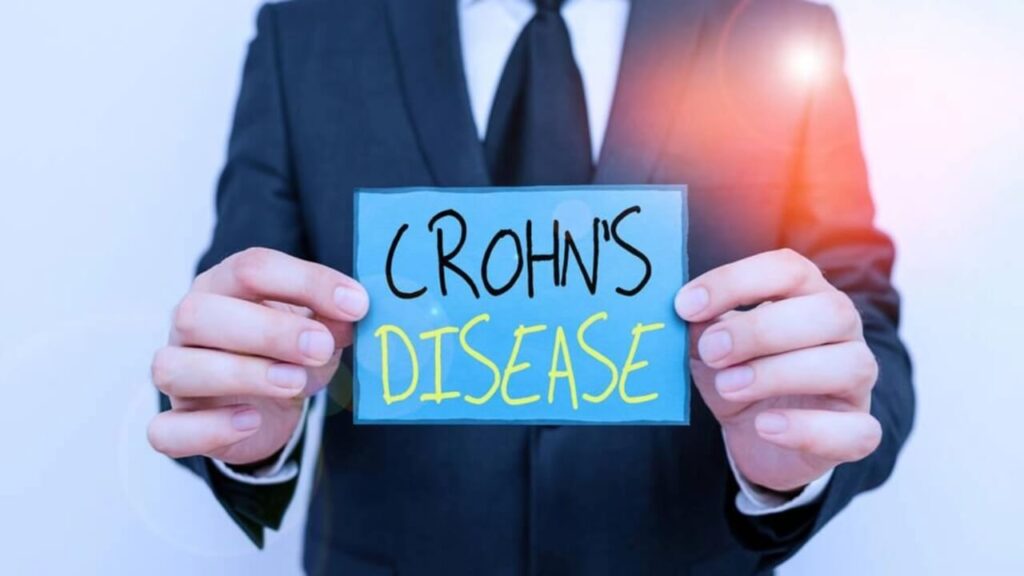
What is Crohn’s Disease?
Crohn’s disease is a chronic inflammatory condition that affects the digestive tract. Here are the key points about Crohn’s disease:
Inflammation and Symptoms:
Crohn’s disease causes swelling of the tissues in the digestive tract, leading to various symptoms.
Common symptoms include:
- Abdominal pain and cramping
- Severe diarrhea
- Fatigue
- Weight loss
- Malnutrition
- Blood in the stool
- Mouth sores
The severity of symptoms can vary from mild to severe.
Areas Affected:
Crohn’s disease can involve different parts of the digestive tract.
Most commonly, it affects the small intestine.
Inflammation often extends into the deeper layers of the bowel.
Complications and Impact:
Crohn’s disease can be painful and debilitating.
It may lead to life-threatening complications.
While there’s no known cure, therapies can reduce symptoms and even achieve long-term remission.
Treatment Options:
Medications, nutritional supplements, and sometimes surgery are used to manage Crohn’s disease.
With proper treatment, many people with Crohn’s can lead functional lives.
Remember to seek medical advice if you experience persistent changes in bowel habits or any of the symptoms associated with Crohn’s disease.
What is Crohn’s disease?
Answered by verified global health professionalsDr. Anet Varghese
Causes of Crohn’s Disease:
Some contributing factors include:
- Family history: Having close relatives with Crohn’s increases the risk.
- Ethnicity: It’s more common in Jews and Caucasians.
- Autoimmunity: The immune system mistakenly attacks the body’s own cells.
- Environmental factors: These may include cigarette smoke or pollution.
Difference Between Crohn’s Disease and Ulcerative Colitis:
Both Crohn’s disease and ulcerative colitis are forms of inflammatory bowel disease (IBD).
Ulcerative colitis:
- Involves continuous inflammation of the colon (large intestine).
- Affects the colonic mucosa (innermost part of the intestinal tract).
- May be localized to specific segments of the colon (e.g., proctitis, proctosigmoiditis, distal ulcerative colitis, or pancolitis).
Crohn’s disease:
- Can affect any part of the intestinal tract, not limited to the colon.
- Commonly affects the colon and the terminal ileum (where small and large intestines meet).
- Inflammation can extend into deeper layers of the bowel.
Similarities:
Both conditions:
- Develop in adolescents or young adults.
- Affect males and females equally.
- Have unknown causes.
- Can occur due to similar risk factors (environmental, genetic, immune responses).
Lifestyle Changes for Managing Crohn’s Disease:
Diet Modifications:
- Avoid greasy or fatty foods, especially fried dishes.
- Limit high-fiber foods (e.g., popcorn, seeds, nuts).
- Hydrate well with fluids like water, broth, and smoothies.
Self-Care Routine:
- Set a timer for medication reminders.
- Monitor symptoms using apps or symptom trackers.
- Contact your doctor at the first sign of a flare.
- Prioritize sleep, exercise, and stress management.
Can Crohn’s disease be improved?
Answered by verified global health professionalsDr. Mayank Saxena
Let’s address each of your questions:
What are the complications of Crohn’s disease?
Complications of Crohn’s Disease:
Crohn’s disease can lead to various complications, including:
- Fistulas: Abnormal connections between different parts of the intestine or between the intestine and other organs (skin, bladder, etc.).
- Intestinal perforation: Holes in the intestinal wall.
- Infections: Such as intestinal abscesses.
- Malnutrition: Reduced nutrient absorption, leading to weight loss, vitamin deficiencies, and weak bones.
- Arthritis, eye inflammation, and skin abnormalities.
- Inflammation of the liver or bile ducts.
- Kidney stones and lung inflammation.
- Anemia due to iron deficiency.
- Delayed growth or sexual development in children.
- Increased risk of colon cancer.
How can I manage stress to help with my symptoms?
Managing Stress for Crohn’s Disease:
While stress doesn’t directly cause Crohn’s disease, it can worsen symptoms in those who already have the condition.
Strategies to manage stress include:
- Deep diaphragmatic breathing and mindfulness meditation.
- Regular exercise (even stretching helps).
- Relaxation techniques.
- Consider therapy or mental health support.
Is there a specific diet plan for Crohn’s patients?
Diet Plan for Crohn’s Patients:
Individual experiences vary, but here are some general guidelines:
- Limit trigger foods (e.g., high insoluble fiber foods, high-fiber foods, lactose-containing foods, sugar alcohols, spicy foods, alcohol, and caffeine).
- Minimize foods associated with inflammation risk.
- Consult with a doctor and a dietitian to tailor your diet to your specific needs.
- Keep a food diary to identify problematic foods.
- Consider a Mediterranean-style diet with whole grains, vegetables, fruits, healthy fats, lean meats, fish, beans, and eggs.
Remember to work closely with your healthcare team to create a personalized plan that suits your unique situation. They can guide you toward better nutrition and stress management strategies.
What are the complications of Crohn’s disease?
Answered by verified global health professionalsWhat are the risk factors for Crohn’s disease?
Risk Factors for Crohn’s Disease:
Age: While Crohn’s disease can occur at any age, it’s more common in individuals under 30 years old.
Family History: Having a close relative (parent, child, or sibling) with Crohn’s disease increases your risk.
Ethnicity: Crohn’s disease is more frequently reported in Jews and Caucasians.
Smoking: Smoking doubles the risk of developing Crohn’s disease.
How is Crohn’s disease diagnosed?
Diagnosis of Crohn’s Disease:
Physical Examination:
Your doctor will perform a thorough physical exam to assess your symptoms and rule out other possible causes.
Lab Tests:
- Complete Blood Count (CBC): Detects anemia (low red blood cell count) and signs of infection or inflammation (high white blood cell count).
Imaging Tests:
- CT Scan: Provides detailed abdominal information, including detecting abscesses that X-rays might miss.
- Endoscopy: Offers a detailed view of the intestine’s interior.
- Barium Swallow: Identifies affected sites and assesses severity.
Treatment Options:
- Medications: Anti-inflammatory drugs (e.g., sulfasalazine, mesalamine), immunosuppressants (e.g., azathioprine, tacrolimus), biologics (e.g., infliximab, adalimumab), and antibiotics.
- Surgery (Colectomy): Removes severely damaged portions of the intestine.
- Diet Management: Work with a registered dietitian to develop a personalized eating plan.
Can diet play a role in managing symptoms of Crohn’s?
Diet and Crohn’s Disease:
Trigger Foods:
These foods cause unpleasant symptoms but don’t necessarily harm your body. Common triggers include:
- High insoluble fiber foods (e.g., raw kale, apple skin, sunflower seeds).
- High-fiber foods (e.g., Brussels sprouts, cabbage, cauliflower).
- High lactose-containing foods (e.g., cow’s milk, cream).
- Sugar alcohols, artificial sweeteners, added sugars, high-fat foods, and spicy foods.
- Alcohol, caffeinated beverages, and sugar-sweetened drinks.
Foods Associated with Inflammation Risk:
- Consuming certain foods frequently over time may increase inflammation risk. Moderation is key.
Hydration:
- Stay well-hydrated by drinking small amounts of water throughout the day.
Consult a Registered Dietitian:
- Work with a dietitian to create a well-balanced, nutrient-rich diet tailored to your needs.
How to identify if one has Crohns?
Answered by verified global health professionalsDr. Anukriti Pant
Symptoms of Crohn’s Disease:
Crohn’s disease is a type of inflammatory bowel disease (IBD) that causes swelling and inflammation in the digestive tract. It most commonly affects the small intestine and the beginning of the colon.
Symptoms can range from mild to severe and may include:
- Abdominal pain and tenderness
- Feeling of a filled abdomen
- Tiredness
- Diarrhea, which can sometimes be mixed with blood, mucus, or pus in severe cases
- Constipation
- Nausea
- Weight loss
- Fever
- Rectal bleeding
- Inflammation of the joints, eyes, and mouth
Children with Crohn’s disease may also experience retarded growth or delayed sexual development.
Impact of Stress on Crohn’s Disease:
Stress alone doesn’t cause Crohn’s disease, but it can worsen symptoms in people who already have the condition.
Chronic stress can:
- Trigger or worsen Crohn’s disease symptoms such as abdominal pain, diarrhea, and food sensitivities.
- Increase the risk of mental health issues like anxiety and depression.
Stress may exacerbate symptoms because it can lead to gastrointestinal (GI) symptoms and interfere with the gut biome.
Research suggests that stress can:
- Heighten inflammation, making existing inflammation in Crohn’s disease worse.
- Disrupt the balance of gut microbiome, worsening inflammation.
- Affect brain structures related to Crohn’s disease.
Cure for Crohn’s Disease:
- Unfortunately, there is currently no known cure for Crohn’s disease.
- Treatment focuses on reducing symptoms and improving long-term prognosis by limiting complications.
- Medications, nutritional supplements, and sometimes surgery are used to manage Crohn’s disease.
- The goal is to reduce inflammation and achieve long-term remission.
Remember to seek medical advice if you experience persistent changes in bowel habits or any of the symptoms associated with Crohn’s disease.
































I am glad to be a visitant of this utter web site! , thanks for this rare info ! .
Some really nice and useful information on this web site, besides I believe the pattern holds superb features.
Thank you for the auspicious writeup. It in fact was a amusement account it. Look advanced to far added agreeable from you! However, how can we communicate?
I’m not sure exactly why but this web site is loading extremely slow for me. Is anyone else having this problem or is it a problem on my end? I’ll check back later and see if the problem still exists.
Hello! Do you know if they make any plugins to help with Search Engine Optimization? I’m trying to get my blog to rank for some targeted keywords but I’m not seeing very good results. If you know of any please share. Appreciate it!
You are my inhalation, I own few blogs and infrequently run out from to brand.
Hello mates, nice paragraph and fastidious urging commented
at this place, I am truly enjoying by these.
I know this if off topic but I’m looking into starting my own blog and was curious what all is required to get set up?
I’m assuming having a blog like yours would cost a pretty penny?
I’m not very web savvy so I’m not 100% sure.
Any suggestions or advice would be greatly appreciated.
Appreciate it
Do you have a spam problem on this blog; I also
am a blogger, and I was wondering your situation; many of us have developed some nice procedures
and we are looking to swap techniques with others, please shoot me an email
if interested.
Thanks for some other informative web site. Where else may
I get that kind of information written in such an ideal method?
I’ve a challenge that I am simply now running on, and I’ve been on the look out for such info.